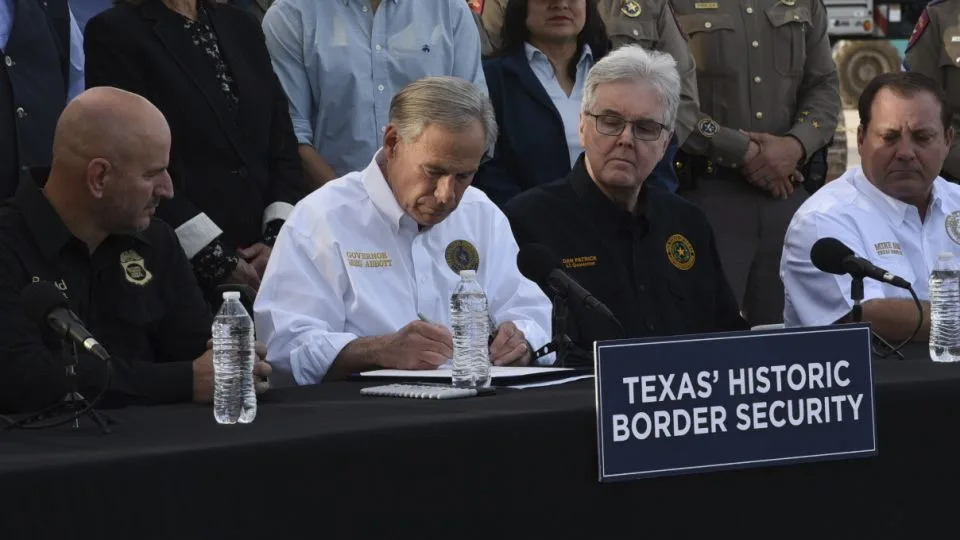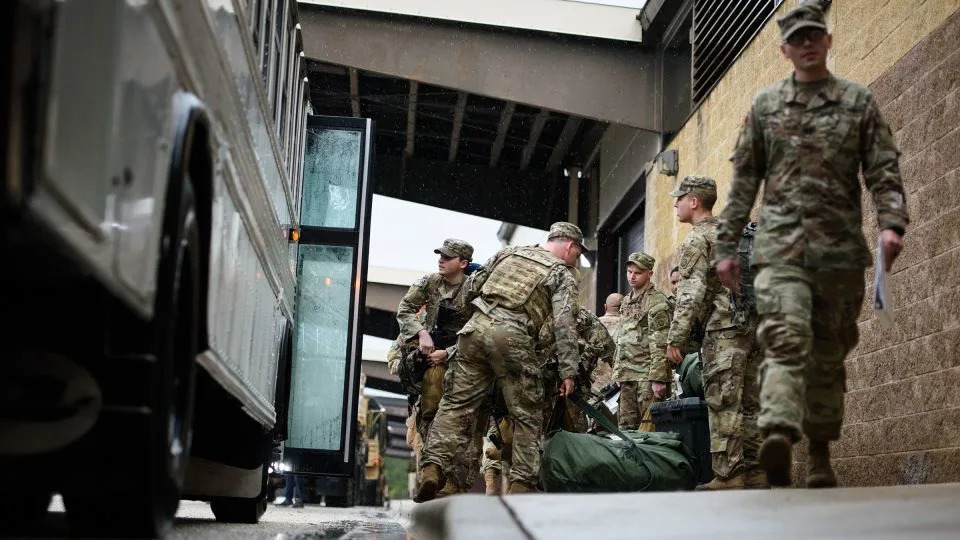Paulina Velasco in Los Angeles
Wed, December 20, 2023

Photograph: Étienne Laurent/EPA
Theresa Cheng was volunteering with mutual aid groups at the US-Mexico border when she learned of a migrant on the US side of the wall with severe injuries. Cheng, an emergency physician, rushed to an encampment where asylum seekers wait to be processed by border patrol and pumped frantically on the chest of a 13-year-old boy bleeding on the ground while volunteers dialed 911.
It took 60 minutes – nearly as much time as Cheng and another migrant did CPR on the teen – for an ambulance and emergency medical services to arrive at the scene in eastern San Diego county. The boy, whom local media identified as Dario Zamudio, had suffered traumatic injuries in a car collision on the Mexican side of the border and had been taken to the border wall to receive quicker treatment.
Related: Texas governor signs bill allowing police to arrest migrants entering US illegally
Zamudio did not make it.
“His heart stopped while he was laying on the ground in the dirt,” Cheng said. “If EMS had arrived earlier, shortly after they were called, his heart wouldn’t have stopped in the field. He could have gone to a hospital and had much better comprehensive emergency care.”
Nearly two weeks later, Cheng’s frustration is palpable. She says she had to ask border patrol agents to help perform CPR, and that she asked multiple times to be allowed to accompany the child in the ambulance to the hospital, but was denied. She says she had tried previously to communicate to paramedics the gravity of the medical situation in the camps.
“That’s why I’m seething,” she said, “because I had this conversation with people on the ground expressing my concern that they aren’t responding appropriately. And then the very next day, a 13-year-old boy died.”
Cheng, who is also a lawyer, is part of a cohort of medical professionals and mutual aid providers along the US-Mexico border and in San Diego county who have been sounding the alarm about the dangers migrants face in open-air detention, especially the lack of medical care. Volunteers have been helping fill the gaps in medical and humanitarian aid in the camps in Jacumba Hot Springs and San Ysidro, where for several months migrants seeking asylum have been waiting to be processed.
When they are unable to use the government’s CBP One app, or present themselves to a US port of entry to request asylum, migrants cross deserts and climb walls to get on US soil. The injuries from wall falls can be gruesome, and when they arrive, asylum seekers have to wait for days in the dangerous outdoor conditions of the open-air detention sites, or OADs.
An 11 December complaint filed on behalf of immigrant rights organizations – including Al Otro Lado, Border Kindness, Southern Border Communities Coalition and the American Friends Service Committee – against the Department of Homeland Security’s office for civil rights and civil liberties, and Customs and Border Protection, explains how asylum seekers on the US side of the border are being held by patrol officers in freezing temperatures, with little food or water, and inadequate medical attention.
The complaint details violations of CBP’s custody standards and migrants’ human rights, like how border patrol provides migrants at four such locations with just one water bottle and one small snack a day, if that. It describes the dry, windy and cold desert locations where migrants are exposed to the elements with no shelter, as temperatures drop to 20F (-6.5C).
“It’s a recipe for disaster,” said Alexander Tenorio, another volunteer physician. “I do fear that if this does continue into the winter, and we keep exposing them to these conditions, there will be more injury, and I do fear there will be death.”
Tenorio said he had tended to pregnant women with stomach pain and bleeding, babies just months and days old, and people with traumatic injuries such as open wounds and possible bone fractures who desperately needed to be evaluated at a hospital. Cheng described seeing 75-year-old women and organ-transplant patients who had run out of medication, migrants with disabilities and those had experienced severe strokes. Individuals the volunteers encounter are already malnourished from their long trip north, and Tenorio says keeping them for days outside without adequate food leaves them at a high risk of developing a medical emergency, like hypothermia.
Jacqueline Arellano, the director of US programs for the mutual aid group Border Kindness, says she didn’t know what the volunteers would do if there were a mass hypothermia event. “Were we to call 911 if there are multiple people experiencing hypothermia, is that same delay going to be expected where possibly it’s going to have to be like an administrative or bureaucratic decision, how quickly they initiate mass emergency response? We’re unsure. They haven’t communicated that to us,” she said.
The corps of volunteer healthcare workers has to triage patients on the ground and can only escalate individuals with urgent medical needs to border patrol or San Diego county EMS. When they do call 911 to have someone taken to a hospital, Arellano said, they encounter major delays in response times and questions about who is responsible.
In some instances, volunteers say, emergency medical dispatch personnel ask for border patrol to confirm whether there is a medical emergency, or screen calls that come from the open-air detention sites. “There seems to be a delay that is specific to the fact that these are migrants,” said Arellano.
Customs and Border Protection said their agency was providing appropriate medical care and “humanitarian assistance as needed and by routinely coordinating with emergency medical services to assist individuals in need”. CBP did not respond to follow-up questions regarding the medical assistance they provide or the incidents provided to the Guardian at the time of publication.
Erika Pinheiro is the executive director of Al Otro Lado, which provides legal and humanitarian assistance to migrants in southern California. She said that while some border patrol agents do call 911, others deter migrants from accessing care by telling them they are faking their illnesses.
“It’s beyond not providing care. It’s malicious obstruction of care,” Pinheiro said.
She said volunteer medical providers have been told they can’t be on-site: “Border patrol claims people are not in custody, and so they do not have the obligation to provide medical services. But when we try to bring in medical services, the physicians have been asked for their credentials. They’ve been kicked out.”
Volunteers have observed multiple instances of border patrol agents telling migrants erroneously that their asylum process will be in jeopardy if they leave the camps for medical care, so migrants sometimes refuse to go to the hospital in emergency situations. Migrants are also refusing care to avoid being separated from their families.
In late November, Pinheiro witnessed a man having a heart attack at a camp in Jacumba. A border patrol agent called an ambulance, but when it arrived the man refused to go, because it would mean leaving his wife and son in the camp.
“I’m watching this guy’s face drooping in front of me, and I’m watching him double over in pain because of his chest pain,” Pinheiro said. “I thought he was going to die in front of me.” Pinheiro finally convinced him that her organization would help him reunite with his family – yet another service volunteers are providing as migrants are discharged with little help to the streets of San Diego.
“We are running a massive humanitarian disaster response on a shoestring budget, doing the best we can. But we’re exhausted and broke and frustrated, frankly, that we’re even still in this position,” she said
Jacumba, where three of the four open-air detention sites are located, has 600 residents, although Pinheiro says an average of 800 migrants circulate through the three camps each day. She said she knew of no additional resources that had been allocated by the county to address the increased need for medical care.
Border patrol, she said, had had an increase in resources commensurate with the increase in migrants in San Diego county this year: “There’s no justification for this. This is cruelty. This is abject and intentional cruelty. This is meant to create a political spectacle showing that the border is out of control so that they can lobby for additional asylum restrictions and additional funding for border patrol.”
In Washington, border security – including funding and asylum restrictions – is at the center of an end-of-year fight between Democrats and Republicans over military aid to Ukraine and Israel.
Meanwhile, volunteers on the ground in Jacumba and San Ysidro are left asking who will take responsibility for the medical emergencies happening at the border right now.
“No matter how you feel about immigration, I would hope that most people don’t want children dying in camps on the California border,” Pinheiro said.
Diego Mendoza
Tue, December 19, 2023

Semafor Signals
Insights from El Financiero, The Young Center for Immigrant Children’s Rights, and El Paso Matters
NEWS
Mexico’s president said Tuesday that he will challenge a new Texas law that gives state authorities power to detain and deport suspected undocumented immigrants.
“We’re always going to be against these measures, and we want to say to our countrymen and migrants that we’re defending them,” said President Andrés Manuel López Obrador. He accused Texas Gov. Gregg Abbott of pursuing a personal political motive to be a vice presidential contender.
Several civil rights groups, including the ACLU, sued Texas on Tuesday, alleging that the law was unconstitutional.
The Biden administration has rebuked the controversial law – known as SB4 – for circumventing federal authorities, paving a path to a Supreme Court showdown, as Republicans slam the White House for not funding border protection.
SIGNALSSemafor Signals: Global insights on today's biggest stories.
Advocates say Texas’ anti-immigration legislation is “rooted in racism”
The law means authorities “can detain you just for your appearance,” fueling a “climate of persecution…especially against Hispanics, Mexicans, and citizens of other nationalities,” wrote Mexican columnist Leonardo Kourchenko for El Financiero. He warned those traveling to Texan cities on business not to be a “victim of abuse,” and advised them to always carry their passports and visas. Groups like the ACLU and the Mexican-American Legislative Caucus have accused SB4 of being “rooted in racism.” The organizations called out Texas for Strong Borders — an anti-immigration lobbying group that pushed for the state legislature to pass SB4 — of having reported links to white supremacist Nick Fuentes.
The law could violate children's rights
Advocates warn that children as young as 10 face a high risk of having their rights violated by the law. The number of unaccompanied children crossing the border has skyrocketed since the COVID pandemic, reaching a record high of more than 152,000 minors in 2022, according to government data. The asylum ban in the U.S. already expedites the deportation of children and families, the Young Center for Immigrant Children’s Rights said, and SB4 will only “exacerbate these conditions” by separating families, rather than protecting children. A federal judge recently prohibited separating families at borders for eight years.
Abbott is spending millions on the border in the name of public safety, but there has been little impact on drug flow or crime rates, wrote Democratic El Paso County Commissioner David Stout. The new law will require Texan taxpayers to fund expansive new criminal infrastructure to account for the estimated 88,000 additional arrests per year, Stout explained, costing at least $162 million in El Paso County alone. Texas should instead focus on “investing in immigrants, and in the trade and cultural exchange opportunities,” Stout suggested, citing studies showing that both documented and undocumented immigrants contribute to lower rates of crime and higher rates of entrepreneurship than native-born Texans.
Analysis by Catherine E. Shoichet, CNN
Wed, December 20, 2023 at 5:00 AM MST·7 min read
When it comes to the US-Mexico border, there’s often so much noise that it’s hard to hear — and see — what’s really going on.
I’ve covered immigration for more than a decade, through three different presidential administrations and through many different moments when people on all sides of the issue have warned of crisis conditions and authorities have appeared overwhelmed.
That’s happening once again. But a few different factors make this moment feel different. The situation is intensifying on several fronts that could have significant consequences both in everyday people’s lives and on the national political stage.
Here are five big reasons why it’s important to pay attention to what’s going on right now:
1. Many people rely on ports of entry along the border. And we’ve seen a growing number of them closing.
In the past few weeks, the Biden administration has closed ports of entry to pedestrians or vehicles in Eagle Pass, Texas; Lukeville, Arizona; and San Ysidro, California.
On Sunday, officials announced they’d also be temporarily shutting down international railway crossings in Eagle Pass and El Paso.
Why is this happening? Officials say the number of migrants illegally crossing the border in some locations is increasing so significantly that they need to divert resources from ports of entry to handle the influx.

A US Border Patrol agent speaks with immigrants at a transit center near the US-Mexico border on Tuesday in Eagle Pass, Texas. Most had crossed the Rio Grande from Mexico the night before. - John Moore/Getty Images
US Customs and Border Protection blames misinformation from transnational criminal organizations and cartels for the recent spike. Border Patrol Chief Jason Owens told CNN’s Rosa Flores recently that agents are “simply overwhelmed” and noted that closing the ports had freed up employees to help process migrants, but also came at a cost.
“It’s a consequence to our lawful trade and travel. Everybody’s feeling it right now,” he said.
Local officials say the port closures are having a devastating economic and personal impact on communities.
Arizona Gov. Katie Hobbs, a Democrat, said in a news release that the decision to close the port in her state “has led to an unmitigated crisis in the area and put Arizona’s safety and commerce at risk.”
2. Trump is making immigration a central focus of his campaign once again. But the words he’s using are changing.
Former President Donald Trump kicked off his 2016 election campaign with notorious comments describing Mexican immigrants as criminals and rapists. And in the leadup to the 2024 election, he appears to be doubling down.
As my colleague Zachary B. Wolf has noted recently, Trump’s “increasingly harsh language demonizing migrants” is reaching new extremes.
In a New Hampshire rally over the weekend, Trump drew comparisons to the language of Nazi Germany with comments about migrants from mostly Africa, Asia and South America “poisoning the blood of our country.”

Former President Donald Trump speaks at a campaign rally Saturday in Durham, New Hampshire. - Reba Saldanha/AP
The next day, Trump claimed, without evidence, that migrants are largely coming to the US from prisons and mental institutions. And he promised to reorient the US government to purge migrants.
Cracking down on illegal immigration was a focus of Trump’s presidency, and there’s little doubt he’d prioritize the issue once again if reelected.
3. Biden seems ready to support the kinds of restrictions he previously criticized.
Before his election in 2020, President Joe Biden repeatedly vowed to roll back the immigration policies of his predecessor. But in the push to get Congress to approve more aid for Ukraine, the Biden administration has signaled a willingness to implement major restrictions that echo changes pursue by the Trump administration.
Negotiations are ongoing. But proposals under consideration include turning back migrants at the US-Mexico border without giving them the chance to seek asylum, expanding a fast-track deportation procedure to include more undocumented immigrants, and raising the credible fear standard for asylum seekers, sources told CNN’s Priscilla Alvarez and Camila DeChalus.
And immigrant rights groups are releasing increasingly frantic statements, decrying what they see as Biden’s willingness to trade away the lives of vulnerable people who are legally entitled to seek asylum. Frustrated by the lack of attention the issue was getting, RAICES said this week that it had bought a seven-story digital billboard ad displaying a shackled Lady Liberty in Times Square warning that “the end of asylum is dangerously near.”
For its part, the Biden administration is defending its track record, with a White House official telling CNN that the administration has led the largest expansion of legal immigration pathways in decades.
But advocates and some lawmakers say Biden is running the risk of losing support from key allies if he makes the concessions he’s reported to be considering.
“If he does go too far in the Trump direction, it’s going to be felt at the ballot box next year, no doubt about it,” Democratic Sen. Alex Padilla told CNN’s Manu Raju.
4. States are taking matters into their own hands. And the potential impact of a new law in Texas is huge.
Frustrated by what they call the federal government’s failure to secure the border, some state leaders are trying to take matters into their own hands. Texas Gov. Greg Abbott, a Republican and outspoken critic of Biden, signed a new law this week that makes entering the state illegally a state crime, gives local law enforcement the power to arrest migrants and gives judges in the state the ability to issue orders removing them to Mexico.

Texas Gov. Greg Abbott signs three bills into law at a border wall construction site in Brownsville, Texas, on Monday, including a controversial measure that makes entering Texas illegally a state crime and gives local law enforcement the power to arrest migrants. - Valerie Gonzalez/AP
The stated aim of the law, which is scheduled to go into effect in March, is cracking down on illegal immigration. Advocates call the law unconstitutional and argue that it will fuel racial profiling in Texas, where 40% of residents are Latino.
The Republican author of the Texas bill has maintained that the measure is constitutional. But state officials may soon have to make their case for the new law in court.
Civil rights groups just filed a lawsuit asking a federal judge to block it.
On the day Abbott signed the bill, protesters nearby said they were already afraid of the impact it could have on their communities.
5. In the US, the ‘border’ is everywhere.
The border isn’t just the 1,933-mile line that divides the US and Mexico. It’s something that can be seen in communities across the US.
And for months, we’ve heard many mayors –— including prominent Democratic leaders — saying their cities are struggling to handle an influx of migrants.
New York Mayor Eric Adams said earlier this year that the migrant crisis would “destroy” the city.
And an order he signed could soon lead to the eviction of thousands of migrants from city shelters as part of Adams’ plan to enforce a new 60-day limit for families. A similar 30-day rule for single adults has been in place for several weeks. Families who receive eviction notices can return to the city’s intake center to re-apply for a new shelter spot.
City officials say they need more support from the federal government, and Adams has said the city’s budget will have to be significantly cut in order to meet the needs of the ongoing crisis.

Migrants line up outside the Jacob Javits Federal Building in downtown Manhattan on December 5. - Luiz C. Ribeiro/NY Daily News/Getty Images
The continuing pushback from local leaders in his own party could have political implications for Biden heading into the 2024 election, and may be one reason why these days, he appears more open to taking a tougher stance.
Any one of these storylines alone is significant news.
Looking at them all together, it’s clear things have reached a crescendo that’s impossible to ignore.
In the coming months, I’ll be watching what’s happening at the border closely.
Many things about the future are uncertain, but there’s no doubt that what we hear and see unfolding there is going to be a big part of the conversation in 2024.
CNN’s Rosa Flores, Sara Weisfeldt, Priscilla Alvarez, Camila DeChalus, Zachary B. Wolf and Gloria Pazmino contributed to this report.
Mexican president says he’ll fight Texas migrant crossing law
Nick Robertson
Tue, December 19, 2023

Mexican President Andrés Manuel López Obrador pledged to fight a new Texas law allowing state authorities to prosecute migrants entering the U.S. from Mexico.
Border issues previously were left to federal authorities, but the inclusion of state and local police contributes to rising tensions between Mexico and the U.S. as Congress struggles to negotiate border security policy.
“The foreign ministry is already working on the process to challenge this law,” López Obrador said Tuesday, Reuters reported.
Texas Gov. Greg Abbott (R) “wants to win popularity with these measures, but he’s not going to win anything, but he’ll lose favor, because in Texas there are so many Mexicans and migrants,” he added.
López Obrador has frequently clashed with Abbot and Florida Gov. Ron DeSantis (R) over immigration, even encouraging Mexican-Americans not to vote for the pair.
The Foreign Ministry filed a challenge against Abbott’s Rio Grande buoys in July, which were also challenged by the U.S. federal government. A federal appeals court ordered them removed from the river this month.
The new migrant prosecution also sets up a fight with the federal government over border authority because Abbott claims the Biden administration has not done enough to stem the flow of immigration across the U.S.-Mexico border.
“The goal of Senate Bill 4 is to stop the tidal wave of illegal entry into Texas. It creates a criminal offense for illegal entry into Texas from a foreign nation for repeat offenders, that creates the events of illegal reentry with a potential prison sentence term of up to 20 years,” Abbott said Monday at the bill signing ceremony.
“Biden’s deliberate inaction has left Texas to fend for itself,” he added, suggesting Texas has a right to defend itself.
El Paso County and the American Civil Liberties Union also filed lawsuits against the state on Tuesday to challenge the law. The legislation is scheduled to go into effect in March.
Mexico to Challenge Texas on Border Migrant Arrests, AMLO Says
Maya Averbuch
Tue, December 19, 2023 at 8:57 AM MST·1 min read
278


(Bloomberg) -- Mexico’s president says his country will challenge a measure signed Monday by Texas Governor Greg Abbott that allows state law enforcement to arrest migrants who entered the US without authorization.
Abbott has repeatedly clashed with the White House over efforts to keep migrants out of Texas and increase inspections of goods trucked through the US-Mexico border. Mexican President Andrés Manuel López Obrador has accused the governor of using such measures for political gain ahead of the 2024 US presidential election.
“We’re always going to be against these measures, and we want to say to our countrymen and migrants that we’re defending them. The governor of Texas is acting this way because he wants to be a candidate for vice president,” AMLO, as the president is known, said Tuesday at his daily press briefing. “He’s not going to gain anything with this measure.”
©2023 Bloomberg L.P.
ACLU sues Texas over controversial immigration law
Olivia Alafriz
Tue, December 19, 2023

The American Civil Liberties Union sued Texas on Tuesday to block a controversial law that would allow police to detain migrants who illegally cross the U.S. border and authorize judges to order their deportation.
The lawsuit, filed in a federal district court, alleges that the bill is unconstitutional and that it runs afoul of federal immigration law.
The ACLU filed the lawsuit with the ACLU of Texas and the Texas Civil Rights Project on behalf of the Las Americas Immigrant Advocacy Center, American Gateways and the County of El Paso, Texas.
“Governor Abbott’s efforts to circumvent the federal immigration system and deny people the right to due process is not only unconstitutional, but also dangerously prone to error, and will disproportionately harm Black and Brown people regardless of their immigration status,” Anand Balakrishnan, a senior staff attorney at the ACLU, said in a statement.
The legislation is the latest in a series of efforts by Texas Republicans to test the limits of the state's authority to tighten border security and stem illegal immigration.
Republican Gov. Greg Abbott signed the bill into law on Monday and it is set to take effect in March.
"President Biden has repeatedly refused to enforce federal immigration laws already on the books and do his job to secure the border. In his absence, Texas has the constitutional authority to secure our border through historic laws like SB 4," Abbott said in a statement to POLITICO, adding that his administration would see the fight through to the Supreme Court if necessary.
Several groups suing Texas over new immigration law
John Krinjak
Tue, December 19, 2023
AUSTIN, Texas - A new lawsuit is challenging a controversial border bill signed by Gov. Greg Abbott on Tuesday. Senate Bill 4 would make undocumented immigration a state crime, allowing Texas police to arrest suspected migrants.
"We're suing to block one of the most extreme anti-immigrant bills in the country," said Adriana Pinon, legal director for the ACLU of Texas.
Less than 24 hours after SB 4 was signed, to "stop the tidal wave of illegal entry into Texas", according to Abbott, the American Civil Liberties Union, ACLU of Texas, Texas Civil Rights Project and others are suing to try to stop it from taking effect.
"It is not in line with the values of Texas," said Edna Yang, co-executive director of American Gateways.
The Austin-based immigrant advocacy group American Gateways is among the plaintiffs.
"I don't think it's just immigrant communities that are going to be targeted. I think it's communities of color and people who may profile as immigrants based on the color of their skin, unfortunately," said Yang.
SB4, which is set to take effect in March, allows Texas police to arrest people who they think crossed the border illegally. Migrants could face a $2,000 fine and six months in jail. Repeat offenders could get up to 20 years in prison. The law also enables judges to send migrants back.
"When they see someone crossing over the border, as the National Guard see, as the Texas Department of Public Safety see, they are not profiling, they are seeing someone violating the law, and now they're going to have the ability to arrest them and prosecute them," said Abbott on Monday.
Abbott believes that will deter many from crossing in the first place.
But the 20-page lawsuit claims "immigration is a quintessentially federal authority" and that "SB4 is patently illegal".
"We think that the law isn't constitutional, and we hope that the lawsuit will be able to challenge its constitutionality," said Yang.
MORE STORIES:
Texas sued over new immigration law
Border Security: Texas bill signed into law allowing state to arrest migrants, challenging federal authority
Abbott argues the constitution specifically allows states to protect their borders when the federal government fails to do so.
"Biden’s deliberate inaction has left Texas to fend for itself," said Abbott.
But some constitutional law experts believe the lawsuit has teeth.
"It rubs directly up against and conflicts with the supremacy clause of the U.S. Constitution. The supremacy clause of the U.S. Constitution asserts that if a state law conflicts with a federal law, then the state law is unconstitutional," said Dr. Eddy Carder, a constitutional law professor at Prairie View A&M University.
In response to the lawsuit, Gov. Abbott said in a statement late Tuesday:
"President Biden has repeatedly refused to enforce federal immigration laws already on the books and do his job to secure the border. In his absence, Texas has the constitutional authority to secure our border through historic laws like SB 4. Texas will take this fight all the way to the U.S. Supreme Court if necessary to protect Texans from President Biden's dangerous open border policies."
Texas slapped with lawsuit over new law allowing police to arrest migrants who cross the border illegally
Bradford Betz
Tue, December 19, 2023
Civil rights groups, including the ACLU, filed a lawsuit against the State of Texas on Tuesday over a new law that gives police the authority to arrest migrants who cross the border illegally and allows judges to order them to leave the U.S.
The American Civil Liberties Union, its Texas branch, and the Texas Civil Rights Project claim on behalf of El Paso County and two immigrant aid groups that the new law, Senate Bill 4, is unconstitutional and preempted by federal law.
The ACLU of Texas called the law the nation’s "most extreme anti-immigration law."
"SB4 lets police arrest people over ‘suspicions’ about immigration status and judges deport people without due process," the group said in an X post. "This is unconstitutional and will harm Black and Brown Texans the most."
ACLU of Texas argued that the law would lead to "racial profiling" and "harassment" with police stopping people because of their skin color or the language they speak.
MANY SENATORS HAVE ALREADY LEFT TOWN AMID BORDER NEGOTIATIONS AS ILLEGAL CROSSINGS HIT RECORD
READ ON THE FOX NEWS APP
Republican Gov. Greg Abbott signed SB4 during a ceremony on the U.S. border in Brownsville on Tuesday.
Immigration enforcement is a federal responsibility. But the law that Abbott signed allows any Texas law enforcement officer to arrest people who are suspected of entering the country illegally. Once in custody, they could either agree to a Texas judge's order to leave the U.S. or be prosecuted on misdemeanor charges of illegal entry. Migrants who don't leave could face arrest again under more serious felony charges.

Asylum seekers wait to be processed by U.S. Border Patrol agents after crossing the Rio Grande from Mexico into the United States on Sept. 30 in Eagle Pass, Texas.
Opponents have called the measure a dramatic attempt by a state to police immigration since a 2010 Arizona law — denounced by critics as the "Show Me Your Papers" bill — that was largely struck down by the U.S. Supreme Court.
A White House spokesperson said Tuesday that SB4 "will make communities in Texas less safe."
SOUTHERN BORDER HIT BY RECORD NUMBER OF MIGRANT ENCOUNTERS IN A SINGLE DAY AS THOUSANDS FLOOD INTO TEXAS
Fox News Digital has reached out to Abbott's office for a response to the new lawsuit. SB4 takes effect in March.

Texas Gov. Greg Abbott looks on during a news conference on March 15, 2023, in Austin, Texas.
Texas Republicans, meanwhile, say the Biden administration isn't doing nearly enough to control the nearly 2,000-mile southern border. Texas has bused more than 65,000 migrants to cities across America since August 2022 and recently installed razor wire along the banks of the Rio Grande.
Fiscal Year 2023 has broken new records, with more than 2.4 million migrant encounters at the border.
September saw a record for encounters at the southern border, while the following month saw a record for encounters in October — with more than 240,000 encounters border-wide.
Funding for more resources at the border has stalled in recent weeks, as Republicans demand it be coupled with restrictions on asylum and the use of parole — a demand which some Democrats have balked at.
1 day after Texas governor signs controversial law, SB4, ACLU files legal challenge
Lauren Villagran, USA TODAY
Updated Wed, December 20, 2023
Texas civil rights organizations and El Paso County on Tuesday sued the Texas Department of Public Safety, challenging a new law that empowers state law enforcement to detain and deport migrants entering or living in the U.S. illegally.
The ACLU filed the lawsuit in U.S. District Court for the Western District of Texas in Austin on behalf of El Paso County and two immigrant advocacy organizations, El Paso's Las Americas Immigrant Advocacy Center and Austin-based American Gateways.
In the complaint, the ACLU calls Texas Senate Bill 4 "patently illegal," and says it violates "the federal government’s exclusive immigration powers and the sensitive foreign policy implications of these powers."
The Texas law takes "control over immigration from the federal government" and deprives immigrants of their rights under federal law, according to the complaint. The complaint asks the court to prevent enforcement of S.B. 4 before the law takes effect on March 5.
Texas Gov. Greg Abbott didn't immediately respond to USA TODAY's request for comment on Tuesday. The Texas Department of Public Safety declined to comment on the lawsuit.
Abbott on Monday signed Senate Bill 4 into law in Brownsville, Texas. He said it and two other laws dealing with border security will "better protect Texas and America."
"President (Joe) Biden’s deliberate inaction has left Texas to fend for itself," Abbott said in a statement on Monday. "These laws will help stop the tidal wave of illegal entry into Texas, add additional funding to build more border wall and crackdown on human smuggling."
Senate Bill 4 passed both houses of the Texas Legislature in November. The legislation mirrors the federal law that makes illegal entry at the U.S. border a misdemeanor and illegal re-entry a felony.
El Paso County Judge Ricardo Samaniego said the law will put a financial burden on the county. The county would be tasked with providing detention space for an expected increase in migrant detainees, arrested by state authorities. A new jail could cost upward of $40 million, he said.
"We feel its unconstitutional what they are doing, and it’s unlike us," Samaniego told USA TODAY. "We want to continue to be us – humanitarian, above the fray of the political stuff."
In a county where interstate highways overlook the low skyline of Ciudad Juárez, Mexico, and thousands of people legally crisscross the U.S.-Mexico border daily, civil rights advocates say lawful residents and U.S. citizens will inevitably be targeted.
More than 80 percent of El Paso County residents identify as Hispanic, according to the U.S. Census Bureau, and many residents can trace their roots to Mexico within a generation or two.
The new Texas law is "rooted in anti-immigrant sentiment," said Marisa Limón Garza, executive director of Las Americas Immigrant Advocacy Center, a plaintiff in the lawsuit.
"We know in El Paso what that looks like. We’re the lucky ones who survived Aug. 3," she said, referring to the Aug. 3, 2019, racist mass shooting targeting Hispanics at an El Paso Walmart in which 23 people died.
Penalties for violating the law against illegal entry range from a class-A misdemeanor to a second-degree felony, which could lead to a 20-year jail sentence.
This article originally appeared on USA TODAY: SB4 legal challenge: El Paso County sues Texas over immigration law
What we know about Texas' new law that lets police arrest migrants who enter the US illegally
VALERIE GONZALEZ
Tue, December 19, 2023


Immigration Texas
Gov. Greg Abbott signs three bills into law at a border wall construction site in Brownsville, Texas on Monday, Dec. 18, 2023, that will broaden his border security plans and add funding for more infrastructure to deter illegal immigration.
McALLEN, Texas (AP) — How far can a state go to keep migrants out of the U.S.?
The answer may soon come out of Texas, where a new law signed by Republican Gov. Greg Abbott this week will allow police to arrest migrants who cross the U.S.-Mexico border illegally and give local judges the authority to order them to leave the country.
Acting quickly, civil rights groups and a Texas border county filed a lawsuit Tuesday that seeks to stop the measure from taking effect in March, calling it unconstitutional. White House press secretary Karine Jean-Pierre also blasted the Texas law but wouldn’t say whether the Justice Department would challenge it.
Here are some things to know:
WHO CAN BE ARRESTED?
The measure allows any Texas law enforcement officer to arrest people who are suspected of entering the country illegally. Once in custody, migrants could either agree to a Texas judge’s order to leave the U.S. or be prosecuted on misdemeanor charges of illegal entry. Migrants who don’t leave could face arrest again under more serious felony charges.
Arresting officers must have probable cause, which could include witnessing the illegal entry themselves or seeing it on video.
The law cannot be enforced against people lawfully present in the U.S., including those who were granted asylum or who are enrolled in the Deferred Action for Childhood Arrivals program.
“The goal of these laws is to make sure that when they see somebody crossing over the border, as the National Guard see, as the Texas Department of Public Safety see, they know they’re not profiling. They are seeing with their own eyes people who are violating the law,” Abbott said Monday.
However, critics, including Mexico President Andrés Manuel López Obrador, worry the law could lead to racial profiling and family separation. American Civil Liberties Union affiliates in Texas and some neighboring states issued a travel advisory this week warning people of a possible threat their civil and constitutional rights violations when passing through Texas.
During a news briefing Tuesday, López Obrador said Abbott was looking to score political points with people’s lives.
“The Texas governor acts that way because he wants to be the Republican vice-presidential candidate and wants to win popularity with these measures,” López Obrador said. “He’s not going to win anything. On the contrary, he is going to lose support because there are a lot of Mexicans in Texas, a lot of migrants.”
WHERE WILL THE LAW BE ENFORCED?
It can be enforced anywhere in Texas.
Republican state Rep. David Spiller, who carried the bill in the Texas House, says he expects the vast majority of arrests will occur within 50 miles (80 kilometers) of the U.S.-Mexico border.
Some places are off-limits. Arrests can't be made in public and private schools; churches, synagogues or other established places of worship; hospitals and other health care facilities, including those where sexual assault forensic examinations are conducted.
Under the Texas law, migrants ordered to leave would be sent to ports of entry along the border with Mexico, even if they are not Mexican citizens.
IS THE LAW CONSTITUTIONAL?
Legal experts and immigrant rights group have said the measure is a clear conflict with the U.S. government’s authority to regulate immigration.
A key claim in Tuesday's lawsuit filed by the ACLU and other groups is that it violates the U.S. Constitution's supremacy clause. The suit accuses Texas of trying “to create a new state system to regulate immigration that completely bypasses and conflicts with the federal system.”
Opponents have called the measure the most dramatic attempt by a state to police immigration since a 2010 Arizona law — denounced by critics as the “Show Me Your Papers” bill — that was largely struck down by the U.S. Supreme Court. The court's 2012 decision on the Arizona law stated the federal government has exclusive power over immigration.
Abbott and other Republicans have said President Joe Biden is not doing enough to control the 1,950-mile (3,149-kilometer) southern border.
“In his absence, Texas has the constitutional authority to secure our border through historic laws like SB 4,” Abbott said in a statement.
The U.S. government has not said whether it will challenge the Texas law, as it did with Arizona's measure.
Mexico's president has indicated his country will intervene.
WHAT IS HAPPENING ON THE BORDER?
Abbott signed the law Monday amid an increase in border crossings that has stretched U.S. Customs and Border Protection resources. Troy Miller, the agency's acting commissioner, has called the number of daily arrivals “unprecedented,” with illegal crossings topping 10,000 some days across the border in December.
Thousands of asylum-seekers who have crossed are sleeping outside along the border overnight as they wait for federal agents to process them. Most are released with notices to appear in immigration courts, which are backlogged with more than 3 million cases.
Many are crossing at the Texas cities of Eagle Pass and El Paso, where federal officials suspended cross-border rail traffic in response to migrants riding freight trains through Mexico, hopping off just before entering the U.S.
The U.S. government also recently shut down the nearby international crossing between Lukeville, Arizona, and Sonoyta, Mexico, to free Customs and Border Protection officers assigned to the port of entry to help with transportation and other support. The agency also has partially closed a few other border ports of entry in recent months, including a pedestrian crossing in San Diego.
___
Associated Press writers Acacia Coronado and Paul Weber in Austin, Texas; Christopher Sherman in Mexico City; and Zeke Miller in Washington, D.C., contributed to this report.










